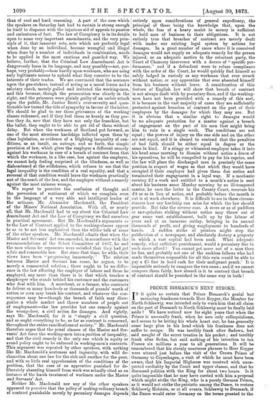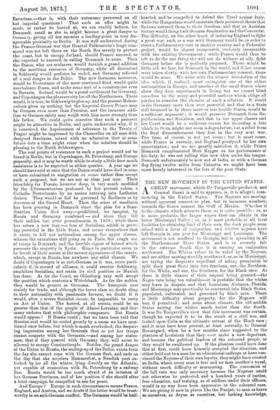PRINCE BISMARCK'S NEXT STROKE.
IS it quite so certain that Prince Bismarck's genial but menacing frankness towards Herr Kryger, the Member for North Schleswig, was intended only to warn him that all claim. on the part of Denmark to North Schleswig must be finally laid) aside ? We have noticed now for eight years that when the Prince is unusually frank, when he uses only colloquialisms, and seems to be letting his whole heart out, he has generally' some large plan in his head which his frankness does not suffer to escape. He was terribly frank after Sadowa, but said naught of the secret treaties in his pocket ; and terribly frank after Sedan, but said nothing of his intention to tax France six millions a year to all generations. It will be remembered that his sternly courteous phrases to Herr Kryger were uttered just before the visit of the Crown Prince of Germany to Copenhagen, a visit of which he must have been aware, that his Imperial Highness was received with unex- pected cordiality by the Court and upper classes, and that he discussed politics with the King for about two hours. Is it quite impossible that he may have carried with him a proposal which might strike the King, who is a purely German Prince, as it would not strike the patriotic among the Danes, to restore Schleswig Holstein, or at all events, Schleswig to Denmark, if the Danes would enter Germany on the terms granted to the
Bavarians,—that is, with their autonomy preserved on all but imperial questions ? That such an offer might be made, or rather be hinted at, we can readily believe, for Denmark, small as she is, might become a great danger to Germany, giving all her enemies a landing-point in very dis- agreeable proximity to Berlin. It was well understood during the Franco-German war that General Falkenstein's huge com- mand was not left there on the North Sea merely to protect the coast, but to occupy Jutland, should France succeed, as she expected to succeed, in calling Denmark to arms. Then the Danes, who are seafarers, would furnish a grand addition to the maritime resources of Germany, while all discontent in Schleswig would perforce be ended, and Germany relieved of a real danger in the Baltic. The new Germans, moreover, would be Protestants of the most convinced kind, would quite overbalance Posen, and make some sort of a counterpoise even to Bavaria. Iceland would be a penal settlement for Germany, and Copenhagen the pleasure city for all the Northerners. There would, it is true, be Schleswig to give up, and the present Hohen- zollern gives up nothing, but the Imperial Crown Prince may be German even more than Prussian, and the immense addi- tion to German safety may weigh with him more strongly than his father. We could quite conceive that such a prospect might be attractive to Berlin, and quite understand why, if it is conceived, the hopelessness of reference to the Treaty of Prague might be impressed by the Chancellor on all men with designed frankness, mixed with an admission that at some future date a time might come when the solution should be pleasing to the North Schleswigers.
The real points of resistance to such a project would not be found in Berlin, but in Copenhagen, St. Petersburg, and Europe generally, and it may be worth while to study a little how much resistance is to be expected in either quarter. A year ago we should have said at once that the Danes would have died in arms or have submitted to emigration en masse rather than accept such a proposal, but we are not so clear just now. Their friendship for France, however deep, is very much modified by the Ultramontanism professed by her present rulers, a Catholic Protectorate by no means entering into Lutheran desires. They would as lief be governed by Berliners as by devotees of the Sacred Heart. Then the sense of smallness has been growing in Denmark since the plan for a Scan- dinavian Union died away—prohibited, we imagine, by Russia and Germany combined — and since they felt their sudden but utter powerlessness in 1870; while there has arisen a new fear,—a fear of Socialism, which is grow- ing powerful in the little State, and seems everywhere that it exists to kill out nationalism among the upper classes, witness the executions still going on in Paris, the rough use of troops in Denmark, and the terrible vigour of hatred which possesses the majority in Spain. Kings in particular seem to be bereft of their senses at the merest appearance of the mania, which, except in Russia, has nowhere any solid chance. We doubt if Copenhagen is as anti-German as it was, more parti- cularly if, in reward of alliance, it could recover Schleswig, annihilate Socialism, and retain its civil position as Munich has done. As for the Court, an Oldenburg may well accept the position which contents a Wittelsbach. As for the nobles, they would be greater as Germans. The bourgeois care mainly for trade, and although the lower class no doubt cling to their nationality with passionate fervour, we doubt if it would, after a severe Socialist e'meute, be impossible to carry an Act of Union. The hatred, at all events, could be no greater than that of the people of Alsace-Lorraine, and Ger- many endures that with philosophic composure. Bat Russia would oppose ? If Russia could ; but we have been told that Russian zeal would be cooled greatly by a cause we have men- tioned once before, but which is much overlooked, the despair- ing impression among her Generale that as yet her troops cannot compete with the Germans,—and among her states- men, that if they quarrel with Germany they will never be allowed to occupy Constantinople. Besides, the grand danger of the Union to Russia, the sealing-up of the Baltic, exists from the day she cannot cope with the German fleet, and ends on the day that she acquires Hammerfest, a Swedish port un- locked by ice all the winter, lying directly on the Atlantic, yet capable of connection with St. Petersburg by a railway line. Russia would be too much afraid of an invasion of her German Provinces, and of her position if she should after a brief campaign be compelled to sue for peace.
And Europe ? Europe in such circumstances means France, England, and Austria, and we doubt if the latter would be trust- worthy in an anti-German conflict. The Germans would be half- hearted, and be compelled to defend the Tyrol against Italy, while the Hungarians would maintain their persistent thesis that Sadowa restored them to their freedom, and that an Austrian victory would bring back German domination and the Concordat. The difficulty, on the other hand, of inducing England to fight a great war, such as a war with Germany would be, in order to resist a Parliamentary vote in another country and a Federalist project, would be almost insuperable, certainly insuperable with the existing Government ; while France would thus be left to do the one thing she will not do without an ally, fight Germany before she is perfectly prepared. There would be little aid, we fear, for Denmark in the world, and if her course were taken slowly, with her own Parliamentary consent, there would be none. We write with the utmost detestation of the idea which, if realised, must extinguish one of the oldest nationalities in Europe, and another of the small States where alone they dare experiments in living, but we cannot blind ourselves to the many and powerful motives which oblige all parties to consider the chances of such a solution. It would make Germany more than ever powerful, and that to a State still hemmed in by three more or less hostile States, would be a sufficient argument ; it would preserve Denmark from Re- publicanism and Socialism, and that to her upper classes and her Court would be a sufficient reason for incurring a fate which to them might not seem a degradation, but a relief from the final dismemberment they fear in the very next war. The time, of course, is not yet come ; but it must come, while France is unready, and England paralysed by her own uncertainties ; and we are greatly mistaken if, while Prince Bismarck complimented Herr Kryger on his performance of his duty, he was not rolling this new idea under his tongue. Denmark unfortunately is now out of India, or with a German flag flying twelve miles from Calcutta, we might have been more keenly interested in the fate of the poor State.































 Previous page
Previous page